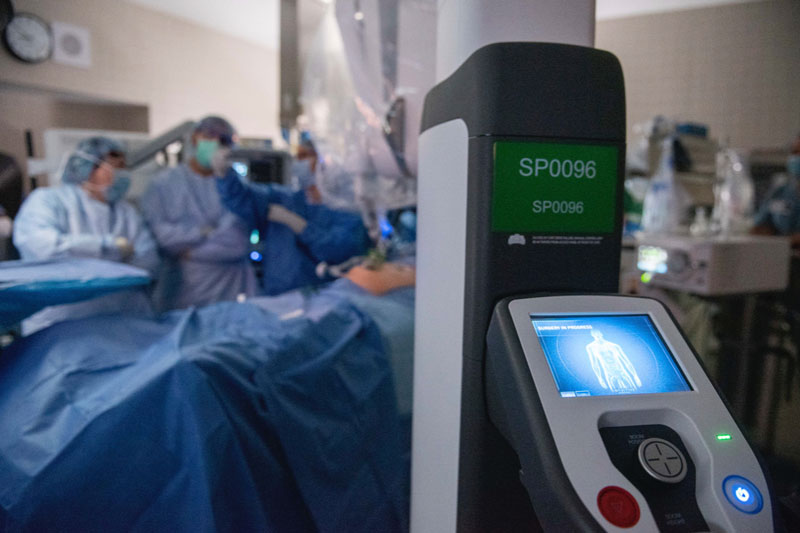
Henry Ford Health System in Detroit is the first in Michigan to offer the da Vinci SP robotic surgery system, which requires a single small incision for its surgical instruments and allows for greater control and access in narrow surgical spaces.
Other da Vinci robots require three to four small incisions for access, and while advanced for many procedures, the single-port robot can help surgeons to perform delicate surgery in small spaces for patients with prostate cancer, kidney cancer, ureteral strictures, and certain types of head and neck cancers.
The da Vinci SP now is available at both Henry Ford Hospital and Henry Ford Macomb Hospital. Surgeons at Henry Ford Health System performed the health system’s first robotic prostatectomy surgeries using the da Vinci SP on Oct. 26.
“Henry Ford Health System has long been on the forefront of robotic surgery,” says Dr. Craig Rogers, chair of the HFHS’s Vattikuti Urology Institute who completed the first robotic prostatectomy using the da Vinci SP at Henry Ford Hospital. “We believe the SP system provides significant benefits for patients as it is even less invasive than previous minimally-invasive robotic surgery systems.”
Because the SP system allows all of the robotic instruments and camera to work through one small incision, Rogers says many patients will experience less pain and may be able to be discharged the same day as the surgery, versus staying overnight at the hospital, which is typically required after standard robotic prostatectomy.
Robotic surgery was pioneered at Henry Ford Hospital beginning in 2000 when Dr. Mani Menon performed the first robotic prostatectomy in the country. Since then, it has performed 33,000 robotic procedures.
Surgeons at Henry Ford have used robot-assisted techniques to improve outcomes for people with many types of cancers, including prostate, bladder and kidney cancer, as well as head and neck cancers, and others.
For surgical procedures of the head and neck, a major advantage of the da Vinci SP surgical system is that its three fully articulating instruments and camera enter the mouth through a single 27mm cannula entry point, versus each of them having to enter individually. This has made some cancers operable that were previously inoperable due to instruments being unable to reach them.
“In addition to being able to operate on cancers we previously couldn’t reach, this robotic surgical system offers the advantages of less bleeding, being more minimally invasive, and providing a quicker return to function for the patient,” says Dr. Tamer Ghanem, director of the Head and Neck Surgery and Microvascular Surgery Fellowship in the Department of Otolaryngology at Henry Ford Hospital. “It can also reduce the need for radiation therapy in some patients, as some cancers that may have been only treatable with radiation can now be removed surgically.”